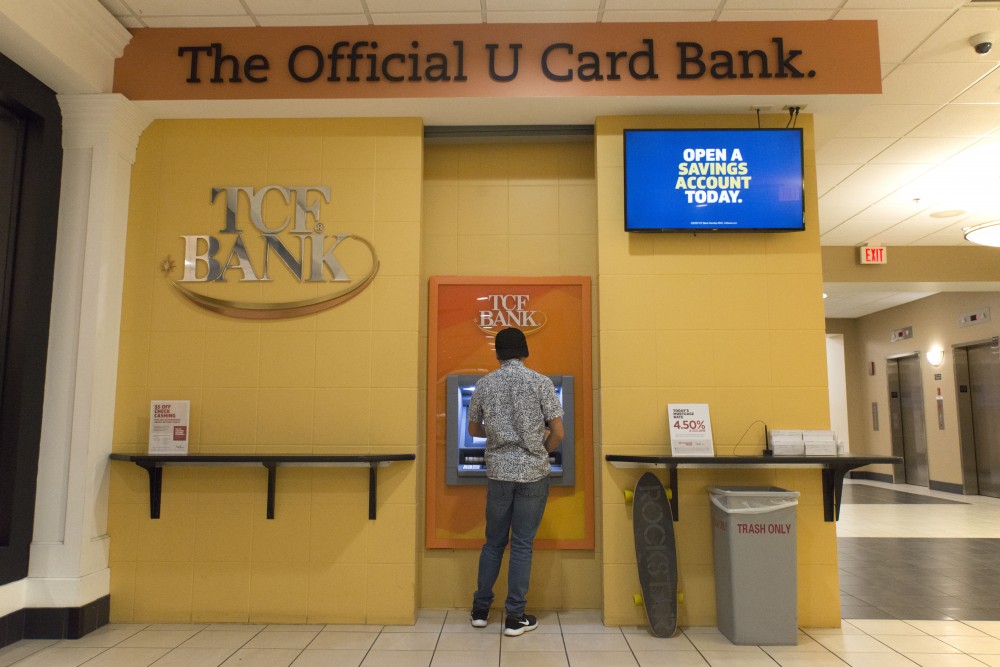The U.S. Public Interest Research Group released a report last week that found University of Minnesota students on the Twin Cities and Duluth campuses paid more than $620,000 to TCF National Bank in card fees during the 2017-18 school year.
According to the study, 44 percent of the University’s student body hold TCF bank accounts. They pay an average of $22 in fees annually, which mainly include overdraft and out-of-network ATM fees, according to Kaitlyn Vitez, the higher education campaign director at U.S. PIRG — an advocacy group that works to protect consumers. Inactivity fees were also cited in the report as a source of fees.
TCF Bank debit cards are heavily marketed to students as a “simple, easy” choice, and these accounts can be linked to U-Cards and used to deposit financial aid.
Vitez said while $22 in fees per year may not seem significant, these fees have serious implications. She noted there are banks available to students that carry no ATM or overdraft fees and there was a wide disparity between the amount of fees paid by individual students. While many paid only a few dollars in fees throughout the year, others were hammered with potentially hundreds of dollars in fees, she added.
The University entered into a paid marketing agreement with TCF Bank in 2003. It granted broad rights to the national bank, including rights to open bank locations, marketing rights on campus and to install TCF Bank ATMs, in addition to other stipulations.
“These types of agreements generally involve a payment from the bank to the school, and may also include non-monetary support, such as staff support, publicity, etc. These agreements primarily allow banks to market directly to students with the help of the school,” the report stated.
The report found that TCF Bank paid $1.6 million to the University in its last reported contract, which included $200,000 specifically for marketing. Vitez said as part of this massive incentive for the University to push TCF Bank cards, the school also gets a $37 royalty per student who opens a TCF account.
While Vitez said direct marketing leads students to be taken advantage of at some schools, George John, a marketing professor in the University’s Carlson School of Management, said the agreement isn’t entirely insidious.
John said many brands team up with one another to capitalize on a bigger audience. The agreement came into being, saying the bank is providing a social service to its students, while hoping these students stay with TCF Bank into adulthood, he added.
The report found at schools with paid marketing agreements, which give the school an incentive to market the card, students pay 2.3 times more in fees than at those schools without paid marketing agreements. In addition, the study found financial protections for students are less robust at schools with paid marketing agreements.
“These fees are not in students’ best interests. Especially when we know that there’s lower fee options available for students,” Vitez said.
Paul Vaaler, an associate professor in Carlson, said these relationships came into existence as banks realized universities have a large, ever-turning-over population that could utilize their services.
“The economics of these partnerships can be really lucrative,” Vaaler said. “It’s a stream of income for the University.”
The University of Minnesota is the only remaining university in a paid partnership with TCF Bank. The University of Michigan and other schools ended their partnerships with TCF Bank in 2015 on mutual terms.
Vitez said these paid marketing agreements began to increase in the early 2000s to help to fill holes in universities’ budgets as federal contributions toward education began to dwindle.
“You should pick a bank the same way that you are picking out a school,” Vitez said. “Explore your options before signing on.”
Correction: A previous version of the article misstated the terms of the 2003 agreement. The University of Minnesota entered a corporate sponsorship in 2005 with TCF Bank, resulting in the naming rights for TCF Bank Stadium. Additionally, the story has been updated to include that the U-Card is a “simple, easy” choice for University students. A previous version of the article misstated how contracts between TCF Bank and other colleges ended.








